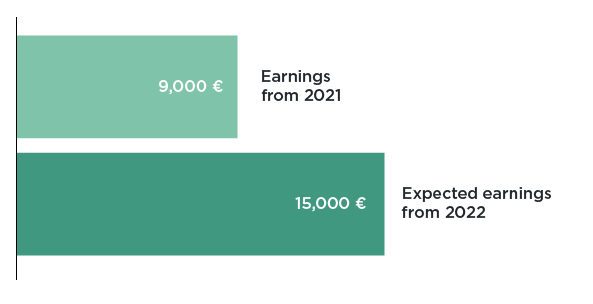Manuel Troya
Pajaretillo | Sierra Cádiz, Spain | 475 Ha

Holistic livestock grazing

Keyline design for water security

Taking action to increase biodiversity
Favourite feature of Carbon+
- The chance to work on the next 10 years management planning with ‘an excellent team’
- Doubling the size of farmable land through a new water network
Results
- A long term farm vision
- Estimated 24,000€ revenue generated in two years of the program (10 years in total)
- Found a community of like-minded farmers with the same passion
Manuel Troya is the owner of Pajaretillo, an agrosilvopastoral system farm that’s been in his family since the 60s. Placed at the foot of the Sierra Cádiz, it’s located in one of the most prestigious livestock regions. But the livestock raised at Pajaretillo isn’t like the rest in the region: it’s regenerative.
Since 2018, Manuel has been readily embracing innovation to ensure ecosystem restoration, animal welfare and a place for biodiversity to thrive as he transitions his farm to regenerative management.
We interviewed Manuel to learn what triggered his transition to regenerative agriculture and how he utilised our Carbon+ Program to reach his goals.
THE TRIGGER TO TRANSITION
After taking over the family farm, Manuel carried on practising conventional agriculture, as had been the case for years. But he brought a new approach. He started analysing the data, meticulously tracking the numbers, and focusing on KPIs.
Manuel realised that conventional agriculture not only had low profitability but also required a huge amount of human effort and did little to support the wider ecosystem. He knew something needed to change – but he wasn’t quite sure what. In pursuit of shaking things up, he attended a conference on holistic management.
“The organiser of the conference said to me, “you’re not only running a non-profitable business, you’re also destroying your farm”. I realised I didn’t want to carry on the conventional path. What I was doing demanded a lot of effort, but the fact I was also destroying my future economy really hit the nail on the head.”
THE CHALLENGE
According to Manuel, conventional agriculture is a short-term game. He received enough financially to sustain the farm for the next year, but there was no end goal. As he puts it: “I was investing a lot of money, but I wasn’t even improving my farm. Rather, I was destroying it.”
To add salt to the wound, external forces also had an internal impact on his farm. Water scarcity, heatwaves and drought are becoming commonplace in Southern Europe. More and more farmers are seeing the dire effects manifest on their land – dry soils, degraded ecosystems and difficulties raising livestock are just a few of the impacts ravaging their fields.
Farmers already at the mercy of our changing climate are also at the mercy of market forces. This was a significant challenge for Manuel. He highlights: “You’re told the price for your produce every week and that’s what you adhere to. You have no choice or power. I didn’t see the logic in maintaining that”.
OVERCOMING CHALLENGES THROUGH CARBON+
Through our Carbon+ Program, Manuel is set to invest in a new water management system that will allow him to build resilience to extreme weather events into the core of his farm. He’ll also be able to extend the boundaries for where his livestock can graze, making his farm business more economically efficient.
“Out of 475 hectares on the farm, I only have access to water in about 250 Ha. Now that I can invest in a water network, I can pump water up the hills. In doing so, I’ll be able to make the farm more resilient, use the land economically and at the same time regenerate the paddocks.”
Beyond the economic and ecological benefits of Carbon+, Manuel believes there’s also a social dimension. Through the program, he’s been able to connect with a diverse network of regenerative farmers throughout Europe.
“I’m in this little corner of Spain, and no one knows what I’m doing. You can hardly talk to other farmers because they’ll close their doors on you. When you share a failure, they’ll say, ‘I told you, this isn’t working’. That really hurts. But through Carbon+, I’ve been able to find people like me with the same passion for sharing successes, failures and support.”
THE CONCRETE
For his first year in the program, Manuel has generated 9,000 euros in revenue from carbon credits. His earnings will be higher this year due to increased carbon sequestration. As he can see so far, he’ll likely be earning around 15,000€. Manuel can accelerate his transition to regenerative agriculture through this new revenue stream and take his farm to the next level.

“The process of going through Carbon+ has been great. It’s made me think of the next ten years and my future. I don’t see a different path for my farm than the one I’m on. You believe in me, and I believe in you. And together, through Carbon+, we can both achieve our regenerative goals.”
Do you want support for implementing regenerative agriculture?





